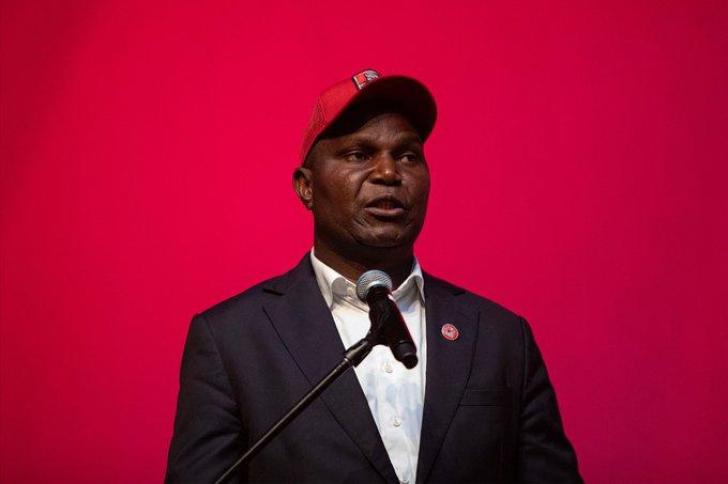News / National
Mnangagwa hails Zimbabwe-Mozambique ties
7 hrs ago | Views

President Emmerson Mnangagwa has reaffirmed the strong and growing economic relations between Zimbabwe and Mozambique during a State Banquet held in honor of visiting Mozambican President Daniel Chapo at the State House in Bulawayo.
President Chapo, who is in Zimbabwe for his first official visit since assuming office, is set to open the 65th edition of the Zimbabwe International Trade Fair (ZITF), currently underway in Bulawayo.
In his address, President Mnangagwa described President Chapo's visit as a symbol of the deep and enduring bond between the two countries. He reflected on the long history of solidarity, noting, "We are forever grateful to the Government and people of Mozambique for the unwavering comradeship during our liberation struggle. Their sacrifices are etched in the blood and memory of our shared history."
Mnangagwa went on to highlight that the revolutionary ties formed during the liberation struggle have now matured into tangible cooperation across various sectors, including energy, agriculture, mining, transport, and climate change mitigation.
The Zimbabwean President also emphasized the growing momentum of economic collaboration between the two countries, particularly with the increasing participation of Mozambican companies in the ZITF and the Business Roundtable. He called this participation a reflection of the expanding trade and investment ties between Zimbabwe and Mozambique.
President Mnangagwa expressed confidence in the success of the Ponta Techobanine Corridor Project, a major cross-border infrastructure initiative that aims to link the Indian Ocean to Zimbabwe through Mozambique. He described the project as vital for both nations' industrialization and modernization efforts. "The importance of shared infrastructure in catalyzing industrialisation and modernisation cannot be overstated," he said. "The Ponta Techobanine Project will have far-reaching benefits for both our economies."
Further praising President Chapo's leadership, Mnangagwa noted the Mozambican President's efforts in engaging various stakeholders to promote peace, stability, and prosperity in Mozambique. He also reiterated Zimbabwe's commitment to supporting regional development initiatives, adding that the country's relationship with Mozambique would continue to strengthen under Chapo's leadership.
"Zimbabwe stands ready to deepen our relations under your leadership," Mnangagwa said. "Our revolutionary parties, ZANU-PF and FRELIMO, will continue working hand-in-hand as we shape our destinies."
The Zimbabwean President extended his congratulations to President Chapo on his recent inauguration, describing it as a resounding endorsement of the ongoing relevance of liberation movements in Africa. "Your election victory is a testament to the continuing appeal of the policies of Liberation Movements, who remain the guarantors of freedom, independence, and sustainable development that leaves no one and no place behind," he said.
The strengthening of bilateral ties between Zimbabwe and Mozambique comes as both countries continue to focus on sustainable development and regional cooperation for the benefit of their people and the broader Southern African region.
President Chapo, who is in Zimbabwe for his first official visit since assuming office, is set to open the 65th edition of the Zimbabwe International Trade Fair (ZITF), currently underway in Bulawayo.
In his address, President Mnangagwa described President Chapo's visit as a symbol of the deep and enduring bond between the two countries. He reflected on the long history of solidarity, noting, "We are forever grateful to the Government and people of Mozambique for the unwavering comradeship during our liberation struggle. Their sacrifices are etched in the blood and memory of our shared history."
Mnangagwa went on to highlight that the revolutionary ties formed during the liberation struggle have now matured into tangible cooperation across various sectors, including energy, agriculture, mining, transport, and climate change mitigation.
The Zimbabwean President also emphasized the growing momentum of economic collaboration between the two countries, particularly with the increasing participation of Mozambican companies in the ZITF and the Business Roundtable. He called this participation a reflection of the expanding trade and investment ties between Zimbabwe and Mozambique.
President Mnangagwa expressed confidence in the success of the Ponta Techobanine Corridor Project, a major cross-border infrastructure initiative that aims to link the Indian Ocean to Zimbabwe through Mozambique. He described the project as vital for both nations' industrialization and modernization efforts. "The importance of shared infrastructure in catalyzing industrialisation and modernisation cannot be overstated," he said. "The Ponta Techobanine Project will have far-reaching benefits for both our economies."
Further praising President Chapo's leadership, Mnangagwa noted the Mozambican President's efforts in engaging various stakeholders to promote peace, stability, and prosperity in Mozambique. He also reiterated Zimbabwe's commitment to supporting regional development initiatives, adding that the country's relationship with Mozambique would continue to strengthen under Chapo's leadership.
"Zimbabwe stands ready to deepen our relations under your leadership," Mnangagwa said. "Our revolutionary parties, ZANU-PF and FRELIMO, will continue working hand-in-hand as we shape our destinies."
The Zimbabwean President extended his congratulations to President Chapo on his recent inauguration, describing it as a resounding endorsement of the ongoing relevance of liberation movements in Africa. "Your election victory is a testament to the continuing appeal of the policies of Liberation Movements, who remain the guarantors of freedom, independence, and sustainable development that leaves no one and no place behind," he said.
The strengthening of bilateral ties between Zimbabwe and Mozambique comes as both countries continue to focus on sustainable development and regional cooperation for the benefit of their people and the broader Southern African region.
Source - the chronicle
































